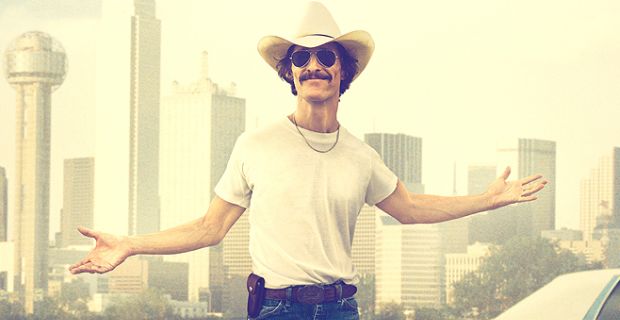
Film: Dallas Buyers Club
Directed by: Jean-Marc Vallee
Starring: Matthew McConaughey, Jared Leto, Jennifer Garner
There are usually a handful of films every Oscar season I can only describe as “workmanlike.” These films don’t attempt to push any stylistic boundaries or create any controversial headlines — they merely aim to tell a fascinating story, and tell it well. Dallas Buyers Club is certainly one of those “workmanlike” films. But damn, does it tell a great story.
Based on true events, the film takes place in 1985, when HIV and AIDS were just entering the consciousness of American society. Matthew McConaughey, whose body fat was at roughly 2% to begin with, lost a reported 38 pounds for his role as Ron Woodroof, a completely different sort of cowboy than the one we saw gyrating in Magic Mike. A jaunt bull-rider who tests positive for HIV after an accident at his day job as an electrician lands him in the hospital, he adamantly believes his doctors (Jennifer Garner and Denis O’Hare) have made a mistake. After all, he’s no homo.
Dallas Buyers Club is simultaneously a story about survival, friendship, personal growth, and of the “little guy” fighting the big, mean system. It’s a feel-good story that doesn’t make you feel like you’re being manipulated. Even as our “hero,” Woodroof makes us dislike him at times. That’s because he serves as a vessel into the era in which the story takes place.
A few months before actor Rock Hudson died of AIDS in October of 1985, he became the first American celebrity to openly admit to having the disease. Woodroof, his rodeo bros, and surely countless others at the time thought they were safe because they believed the disease’s reach was limited to the homosexual community. Little did Woodroof know that his free-wheeling lifestyle of drug use and unprotected threesomes with fellow users in the rodeo pits between bullrides put him at risk as well.
Woodroof’s doctors give him 30 days to live and his homophobic friends turn their backs on him. And while he may be ignorant, Woodroof is no dummy. He does his research and knows there are some new, unapproved drugs that could increase the length and quality of his life. One such drug is called AZT. The drug is being tested at Woodroof’s hospital, but the test subjects have no idea if they’re getting AZT or a placebo. A side effect of the AZT the doctors are using for their tests is that it kills blood cells at an alarming rate, and Woodroof knows he can get safer and more effective drugs outside the country and begins smuggling them across the border from Mexico.
One of the patients participating in the AZT testing is named Rayon, a cross-dresser played by an equally emaciated Jared Leto. After much reluctance and name-calling on the part of Woodroof, the two form an unlikely bond and business partnership. Woodroof has the drugs, and Rayon has the trust of those who need them. Their business model: for $400 per month, you get all the drugs you need. They’re not selling drugs, they’re selling memberships. And that should keep the feds off their asses, at least for a little while.
Unless you count the over-the-top music videos from his rock band 30 Seconds to Mars, this is Leto’s first film role since 2009’s Mr. Nobody, which was seen by, well, nobody. Rayon is the heart of the film and it’s a testament to Leto’s talent and to writers Craig Borten and Melisa Wallack that they’re able to turn a character that could have been riddled with cliches into a fully formed character that every member of the audience can relate to.
Despite the 30 day timetable the doctors give him, Woodroof’s fight goes on for years. He eventually takes on the FDA for their lengthy drug-approval process and gains the respect of Garner’s character, who begins questioning the morality of her position in the hospital. So while Dallas Buyers Club has more layers than you might expect, director Jean-Marc Vallee (The Young Victoria), handles them all with confidence and delivers a truly memorable piece of storytelling.
I’m not convinced that Woodroof ever gets over his homophobia as his insults never seem to cease, but they do turn more playful. “Would you stop staring at her tits? You’re starting to look normal,” he tells Rayon, who’s contemplating the size of the implants he might want. Aside from one rather forced scene where Woodroof puts an old friend in a chokehold and forces him to shake Rayon’s hand, the growth of their friendship feels natural and I truly bought into it by the end of the film. Sometimes the brightest light really does come from the darkest places.
Grade: A-
Review written by: Kevin Blumeyer
- Ceremony Announce New Album, Debut Somber New Tracks - March 27, 2015
- Muse Get “Psycho” on New Track From ‘Drones’ - March 12, 2015
- Tame Impala Release New Single “Let It Happen,” Announce Massive U.S. Tour - March 11, 2015
